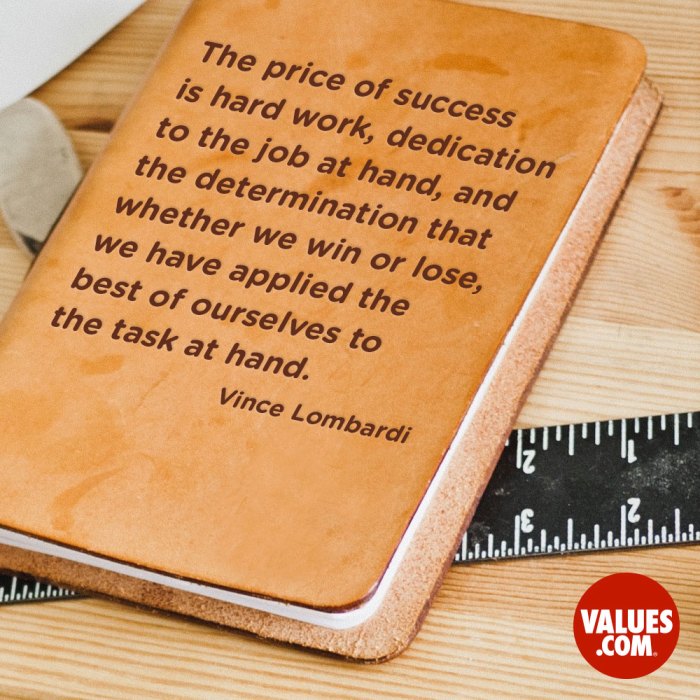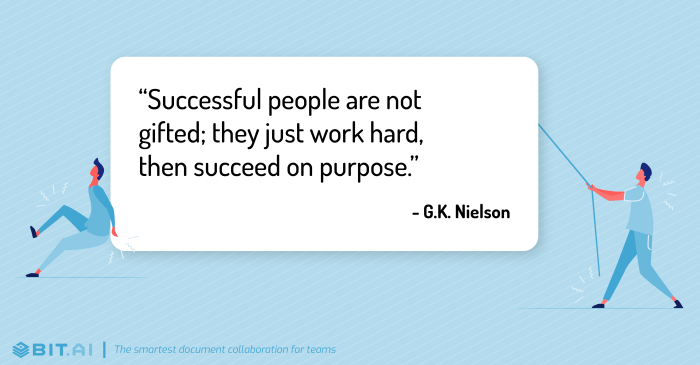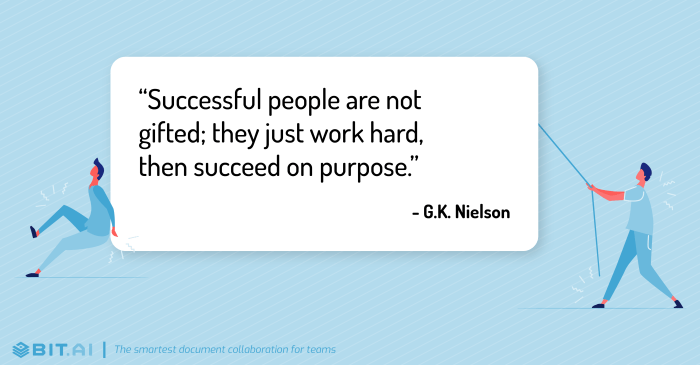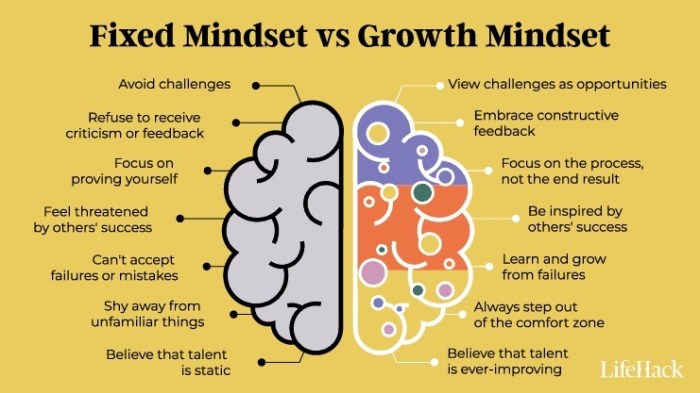The price to success is hard work. It’s a simple truth, yet one often overlooked in today’s fast-paced world. This journey delves into the multifaceted nature of hard work, exploring its various forms, the importance of perseverance, and the crucial balance needed for long-term success. We’ll examine how hard work translates across different fields, from academics to business, and how it intertwines with other essential factors like talent and opportunity.
From defining the very essence of hard work and its distinction from mere effort, to understanding the role of persistence in overcoming obstacles, we’ll unravel the intricate threads that connect dedication to achieving goals. We’ll also explore how to navigate challenges effectively, maintain a positive mindset, and ultimately achieve personal growth through hard work. Finally, we’ll address the vital importance of work-life balance, ensuring that the pursuit of success doesn’t come at the cost of overall well-being.
Defining Hard Work
The path to success is rarely paved with ease. While talent and opportunity play a role, a crucial ingredient consistently stands out: hard work. It’s not merely putting in effort; it’s a multifaceted approach demanding dedication, persistence, and a strategic understanding of the tasks at hand. This exploration delves into the nuances of hard work, differentiating it from mere effort, and highlighting its diverse manifestations across various fields.Hard work transcends the simple act of exertion.
It encompasses a conscious and sustained commitment to achieving a specific goal. It involves meticulous planning, proactive problem-solving, and a willingness to learn and adapt along the way. It’s about leveraging one’s skills and resources effectively, constantly striving for improvement, and recognizing that setbacks are inevitable yet surmountable.
Defining Effort vs. Hard Work
Effort is the expenditure of energy. Hard work, however, is effort channeled strategically toward a specific goal. Effort can be random, unfocused, or even counterproductive if not directed correctly. Hard work, on the other hand, is intentional, purposeful, and ultimately yields measurable results. A student studying for an exam with a focused plan demonstrates hard work; aimless cramming represents effort.
Forms of Hard Work Across Fields
Hard work manifests in countless ways, adapting to the specific demands of various professions. In the realm of entrepreneurship, it entails meticulous market research, strategic planning, and consistent execution. In the arts, it translates to relentless practice, unwavering dedication to craft, and a willingness to embrace constructive criticism. In academia, it involves sustained study, critical thinking, and a proactive approach to learning.
- In sports, hard work translates to rigorous training regimes, consistent practice, and unwavering discipline. It encompasses not only physical exertion but also mental fortitude and strategic thinking.
- In technology, hard work manifests as innovative problem-solving, continuous learning, and an unwavering commitment to refining existing systems and technologies.
- In customer service, hard work involves actively listening to customer needs, providing solutions with empathy, and striving to exceed expectations.
The Importance of Persistence
Persistence is the bedrock of hard work. Success rarely comes overnight. Obstacles and setbacks are inevitable; what truly distinguishes those who succeed is their ability to persevere through these challenges. It’s the ability to adapt to new information, to learn from mistakes, and to keep pushing forward even when the path seems arduous.
- Persistence is the unwavering continuation of an action or pursuit despite facing obstacles or setbacks. It’s about maintaining a positive outlook and staying focused on the desired outcome, even in the face of adversity.
- A consistent, focused approach is crucial to achieving significant goals. Persistence ensures that setbacks are not seen as failures, but as opportunities for learning and improvement.
Dedication and Goal Achievement
Dedication is the unwavering commitment to a cause or goal. It’s the willingness to invest time, energy, and resources into achieving something meaningful. The link between dedication and goal achievement is profound. A dedicated individual is motivated to overcome challenges and is resilient in the face of adversity. This commitment ensures that the effort is channeled effectively, ultimately leading to tangible results.
“Success is not final, failure is not fatal: it is the courage to continue that counts.”
Winston Churchill
The Value of Perseverance
The journey to success is rarely a smooth one. Obstacles, setbacks, and moments of doubt are inevitable. However, it is the ability to persevere through these challenges that often distinguishes those who achieve their goals from those who don’t. Perseverance isn’t merely about pushing through; it’s about maintaining a resilient spirit, learning from failures, and adapting to changing circumstances.
It’s about the unwavering belief in your own potential, even when the path ahead seems daunting.Sustaining motivation during difficult periods requires a conscious effort. It’s not about ignoring the struggles, but about recognizing them, understanding their role in the process, and finding ways to navigate them effectively. Perseverance is the cornerstone of long-term success, a vital ingredient in building resilience, and a characteristic shared by countless individuals who have overcome adversity to achieve remarkable feats.
Overcoming Obstacles
Perseverance is the driving force that enables individuals to overcome the obstacles that inevitably arise on the path to success. It’s not about avoiding difficulties but about confronting them head-on, learning from each setback, and adapting strategies to achieve desired outcomes. This process often involves reevaluating plans, seeking new knowledge, and adjusting approaches based on experience.
Maintaining Motivation
Maintaining motivation during challenging times requires a multifaceted approach. This involves setting clear, attainable goals, breaking down large tasks into smaller, more manageable steps, and celebrating milestones along the way. Visualization techniques, such as imagining success, can also be instrumental in maintaining a positive outlook. Building a supportive network of friends, mentors, or family members can provide encouragement and accountability during difficult periods.
Let’s be honest, achieving anything worthwhile takes dedication. The price to success is undeniably hard work, but that doesn’t mean you should just accept your current role. If you’re ready for a step up, mastering the art of asking for a promotion is crucial. Learning how to articulate your value and demonstrate your readiness for a bigger role can be a game-changer, and a great resource for that is how to ask for a promotion.
Ultimately, though, that hard work and strategic approach are still the cornerstones of any successful career trajectory.
Resilience in Long-Term Goals
Resilience is the capacity to bounce back from adversity. It’s an essential component of perseverance, enabling individuals to withstand setbacks and maintain their focus on long-term goals. Resilience is cultivated through self-reflection, learning from mistakes, and developing a growth mindset, where challenges are viewed as opportunities for learning and growth. This approach helps individuals to adapt to changing circumstances and navigate the inevitable ups and downs of any pursuit.
Examples of Perseverance
Numerous individuals have achieved remarkable success through perseverance. Consider Marie Curie, who faced societal barriers and personal hardships to become a pioneering scientist. Similarly, Nelson Mandela, despite imprisonment and immense struggle, dedicated his life to achieving equality and justice. These individuals, and many others, demonstrate that perseverance is not just a desirable trait, but a vital ingredient in achieving significant accomplishments.
Strategies for Maintaining Perseverance
| Strategy | Description | Benefits | Drawbacks |
|---|---|---|---|
| Goal Setting | Clearly defining specific, measurable, achievable, relevant, and time-bound (SMART) goals provides focus and direction. Breaking down larger goals into smaller, more manageable tasks makes progress more visible and rewarding. | Increased focus, improved time management, and a sense of accomplishment. | Can be overwhelming if goals are too ambitious or unrealistic. Requires consistent effort to stay on track. |
| Self-Discipline | Developing self-discipline involves the ability to regulate emotions, prioritize tasks, and resist distractions. It’s the internal compass that guides individuals toward their objectives, even when faced with temptations or challenges. | Increased productivity, improved decision-making, and greater control over personal habits. | Can be difficult to maintain consistently, requiring ongoing effort and self-awareness. |
Hard Work in Different Contexts: The Price To Success Is Hard Work
The concept of hard work, while seemingly straightforward, takes on multifaceted forms depending on the field of endeavor. From the rigorous demands of a competitive academic environment to the relentless pursuit of athletic excellence and the cutthroat world of business, the application and interpretation of hard work vary significantly. Understanding these nuances is crucial to appreciating the diverse strategies employed by individuals to achieve success.Hard work isn’t a one-size-fits-all approach.
It’s about tailoring effort and dedication to the specific requirements of the context, whether it’s the intense focus needed for a demanding exam or the strategic planning required for a startup. Cultural differences further complicate the picture, highlighting how perceptions of work ethic and dedication can differ across societies.
Academic Hard Work
Academic success demands a unique blend of focused study, disciplined time management, and persistent problem-solving. Students often need to navigate complex subject matter, balancing multiple courses and extracurricular activities. Effective study strategies, like creating a study schedule and utilizing effective note-taking techniques, are paramount. Moreover, seeking help from professors or tutors when needed is a crucial aspect of academic hard work.
Sports Hard Work
Athletic excellence is a direct result of relentless physical training, coupled with mental fortitude. Athletes must commit to rigorous regimens of practice, incorporating strength training, endurance exercises, and skill development. The dedication extends beyond the physical realm; mental preparation, including visualization and positive self-talk, is also essential. Athletes often sacrifice leisure time and social activities to achieve peak performance.
We all know the price to success is hard work, but sometimes that work feels overwhelming. Finding healthy ways to de-stress and feel relieved is crucial for maintaining motivation and achieving goals. For example, checking out 40 ways let and feel relieved might offer some helpful strategies for managing stress and regaining a sense of calm.
Ultimately, recognizing the need for both hard work and healthy stress relief is key to long-term success.
A clear understanding of individual strengths and weaknesses, coupled with targeted training programs, is critical to success.
Business Hard Work
In the competitive landscape of business, hard work translates into meticulous planning, strategic decision-making, and relentless pursuit of goals. Entrepreneurs must possess a strong work ethic, managing time effectively, and consistently seeking new opportunities. Adaptability and resilience are crucial to navigating the unpredictable nature of the market. Learning from failures and adapting strategies are vital for sustained success.
Business hard work also involves building strong relationships, collaborating effectively with teams, and maintaining a positive outlook.
Cultural Variations in Hard Work
Different cultures have distinct perspectives on the value of hard work. Some cultures prioritize collective effort and team spirit, while others emphasize individual achievement and self-reliance. This disparity influences the strategies individuals employ and the rewards they perceive. Understanding these cultural nuances is critical for success in diverse work environments. For instance, some cultures value long hours and dedication to a single task, while others emphasize work-life balance.
Importance of Adaptation
Success in any field necessitates a willingness to adapt to new challenges and evolving circumstances. The ability to adjust strategies, embrace new technologies, and learn from setbacks is essential for long-term achievement. Adaptability allows individuals to navigate uncertainties and seize opportunities that arise. Individuals who demonstrate adaptability are better positioned to handle unforeseen circumstances and remain competitive.
Examples of Success Through Specific Strategies
Numerous individuals have achieved remarkable success through specific strategies in different areas. For instance, Elon Musk’s innovative approach to business and technology, characterized by relentless focus and a willingness to take risks, led to the creation of several successful companies. Similarly, Serena Williams’ unwavering dedication to training and competition, coupled with her strategic approach to match play, solidified her legacy as a tennis icon.
These examples illustrate the power of tailored strategies in achieving success.
Comparison of Hard Work Approaches Across Industries
| Industry | Key Characteristics of Hard Work | Examples of Strategies |
|---|---|---|
| Academics | Focused study, time management, seeking help when needed | Creating a study schedule, utilizing effective note-taking, attending office hours |
| Sports | Rigorous physical training, mental fortitude, strategic planning | Developing a training regimen, practicing visualization, analyzing performance |
| Business | Strategic planning, decision-making, adaptability, resilience | Developing a business plan, analyzing market trends, learning from failures |
Hard Work and Other Factors

Success isn’t solely built on hours logged. While hard work is a crucial ingredient, other elements play a significant role in achieving goals. Understanding how these factors interact and how to leverage them is key to maximizing potential. This exploration delves into the intersection of hard work with talent, opportunity, and luck, offering strategies for a balanced approach.Hard work is a powerful force, but it’s rarely the sole determinant of success.
Other factors, like inherent talent, advantageous circumstances, and even a touch of luck, often play significant roles. A comprehensive understanding of these interacting forces allows us to develop a more nuanced and effective approach to achieving our ambitions. We must not only commit to hard work but also recognize and utilize the opportunities that come our way.
The Interplay of Hard Work, Talent, and Opportunity
Talent, often described as innate ability or aptitude, can provide a head start in certain fields. However, raw talent alone rarely guarantees success. A combination of talent and dedication to develop that talent through hard work is often a more potent recipe. Similarly, an opportune environment can significantly impact outcomes. Having the right connections, access to resources, or the right timing can greatly amplify the impact of hard work.
Luck, while often unpredictable, can also present unexpected opportunities. A successful outcome is rarely a solitary event but rather a confluence of these elements.
Strategies for Leveraging Other Factors
Recognizing the influence of talent, opportunity, and luck is crucial. It allows for proactive strategies to enhance the impact of hard work. Developing a growth mindset, actively seeking opportunities, and building a supportive network are essential components. Furthermore, understanding your strengths and aligning them with available opportunities is critical for maximizing potential. Finally, embracing calculated risk-taking, while acknowledging the role of chance, can open doors that might otherwise remain closed.
The Role of Talent
Talent provides a foundation, but it’s crucial to remember that talent is often a catalyst for hard work. The passion for improvement that comes from natural inclination can inspire dedication. A natural aptitude for a field can motivate someone to put in the extra effort to master their skills and become proficient. The interplay between talent and hard work often creates a synergistic effect, leading to exceptional outcomes.
The Importance of Opportunity
Opportunity presents itself in various forms, from favorable market conditions to influential mentors. Recognizing these opportunities and seizing them requires alertness and adaptability. Networking, building relationships, and actively seeking out new knowledge and experiences are crucial for creating opportunities and leveraging them effectively. Opportunity is not always readily apparent, so a proactive approach is vital for maximizing potential outcomes.
The Role of Luck
Luck, though unpredictable, can play a significant role in success. Sometimes, the right moment, the right person, or the right combination of events can unexpectedly open doors. Recognizing the role of luck, however, doesn’t diminish the importance of hard work. Instead, it emphasizes the necessity of being prepared and adaptable to capitalize on fortunate circumstances. A proactive and prepared individual is more likely to recognize and benefit from fortuitous occurrences.
Hard Work, Talent, and Opportunity: A Balanced Approach
| Factor | Description | Relationship with Hard Work |
|---|---|---|
| Hard Work | Consistent effort and dedication | Essential component, foundational to success |
| Talent | Natural ability or aptitude | Can be a catalyst for hard work, but hard work refines and develops it. |
| Opportunity | Favorable circumstances or situations | Can amplify the impact of hard work and talent. |
Overcoming Challenges
The pursuit of success is rarely a smooth path. Obstacles and setbacks are inevitable, and how we navigate these challenges often determines our ultimate outcome. Learning to effectively confront adversity is a crucial skill for anyone striving to achieve their goals. This section will explore common challenges, strategies for overcoming them, and maintaining a positive mindset during difficult times.
Common Challenges in Pursuing Success
Facing adversity is a universal experience. Individuals pursuing success encounter a range of challenges, often stemming from internal factors, external pressures, or a combination of both. These can include self-doubt, procrastination, fear of failure, limited resources, and unexpected circumstances like economic downturns or personal crises. The ability to identify and understand these challenges is the first step toward overcoming them.
Addressing Setbacks and Obstacles
Setbacks are not failures; they are opportunities for growth. A crucial aspect of overcoming challenges is to view setbacks as learning experiences. Instead of dwelling on the negative, focus on analyzing the situation, identifying the root cause of the setback, and determining how to avoid similar issues in the future. Adaptability and resilience are key.
Strategies for Maintaining a Positive Mindset
Maintaining a positive mindset during challenging times is essential for sustained motivation and success. Strategies include focusing on past successes, celebrating small victories, seeking support from mentors and peers, practicing mindfulness and meditation, and setting realistic goals. A positive mindset fosters resilience and allows individuals to bounce back from setbacks more effectively.
Examples of Overcoming Setbacks in Various Fields
Numerous individuals have demonstrated remarkable resilience in the face of adversity. For instance, consider the story of Steve Jobs, who faced setbacks and failures throughout his entrepreneurial journey but ultimately revolutionized the technology industry. In the arts, artists often face rejections and criticism, but those who persevere and refine their craft can achieve recognition. In the business world, entrepreneurs who encounter financial difficulties and market fluctuations often develop strategies for recovery and growth.
These examples highlight the importance of perseverance and adaptability.
Flowchart for Overcoming Challenges
The process of overcoming challenges can be visualized as a flowchart. 
Let’s be real, the price to success is hard work, dedication, and often a whole lot of late nights. Navigating the complexities of a career path, especially in a field like law, demands significant effort. For example, understanding the unique dynamics of dating a lawyer requires a special set of insights, like the ones found in this helpful guide about 9 things you need to know before dating a lawyer.
Ultimately, whether it’s in the courtroom or in a relationship, understanding that commitment and hard work are essential ingredients to achieve anything worthwhile.
Note: A visual representation of a flowchart is not possible within this text-based format. A flowchart would illustrate the steps, including: Identifying the challenge, analyzing the challenge, developing strategies, implementing strategies, evaluating results, adapting strategies, and celebrating successes.
Hard Work and Personal Growth

Hard work is more than just toiling; it’s a catalyst for profound personal development. It’s a journey that shapes not only our skills and abilities but also our character, resilience, and self-discipline. Beyond the tangible achievements, the process itself cultivates a stronger, more capable individual. This section will explore the intricate link between dedication and personal growth, examining how hard work nurtures essential qualities and transforms individuals.The connection between hard work and personal growth is undeniable.
Consistent effort, whether in academics, athletics, or any pursuit, fosters a deep understanding of one’s capabilities and limitations. This understanding, in turn, allows for self-improvement and the development of crucial life skills. The experience of overcoming challenges through hard work builds resilience and self-belief, creating a powerful foundation for future endeavors.
The Cultivation of Self-Discipline
Hard work inherently demands self-discipline. Maintaining a consistent routine, prioritizing tasks, and overcoming procrastination are all essential elements of the hard work ethic. Individuals who cultivate self-discipline through hard work develop a strong sense of responsibility and commitment, not only to their goals but also to themselves. This translates into greater control over their lives and increased confidence in their ability to manage their time and resources effectively.
Building Resilience Through Adversity
The path to success is rarely smooth. Hard work inevitably involves encountering obstacles and setbacks. Overcoming these challenges through persistence and dedication builds resilience. Each hurdle crossed strengthens the individual’s ability to bounce back from adversity, fostering a more adaptable and resourceful character. This resilience extends beyond professional life, impacting personal relationships and overall well-being.
Character Building Through Hard Work
Hard work, when coupled with integrity and ethical conduct, contributes significantly to character building. The commitment to excellence, the pursuit of knowledge, and the perseverance through difficulties shape a strong moral compass. These qualities, in turn, contribute to a sense of integrity and responsibility, shaping a person into a valuable and trustworthy member of society. Examples of individuals who have exhibited remarkable personal growth through hard work are numerous.
Examples of Individuals, The price to success is hard work
Nelson Mandela, despite facing immense adversity and imprisonment, persevered and ultimately became a symbol of reconciliation and freedom. His unwavering commitment to his ideals, honed through years of struggle, led to remarkable personal growth and a profound impact on the world. Similarly, individuals like Marie Curie, through relentless dedication to scientific research, achieved groundbreaking discoveries that revolutionized our understanding of the world.
Their stories underscore the transformative power of hard work in shaping personal growth.
Skills Developed Through Hard Work
| Skill | Description |
|---|---|
| Perseverance | The ability to continue working toward a goal despite setbacks or challenges. |
| Time Management | The ability to organize and prioritize tasks effectively, maximizing productivity and efficiency. |
| Problem-Solving | The ability to identify, analyze, and resolve issues through critical thinking and creative approaches. |
| Adaptability | The ability to adjust to changing circumstances and conditions, maintaining effectiveness and resilience. |
| Focus | The ability to concentrate on tasks at hand, minimizing distractions and maximizing output. |
Hard work, in all its facets, fosters the development of these essential skills. The table above Artikels the range of abilities honed through the dedication to personal and professional goals. These skills are not just beneficial in the workplace, but are crucial for navigating life’s challenges and achieving a fulfilling personal journey.
Maintaining Balance
Striving for success often demands significant dedication and hard work. However, an equally crucial aspect of achieving lasting success is maintaining a healthy work-life balance. Ignoring this balance can lead to burnout, impacting both personal well-being and professional performance. A sustainable approach to hard work acknowledges the importance of rest, rejuvenation, and personal time.Maintaining a healthy equilibrium between work and personal life is essential for long-term success.
Burnout, a common consequence of relentless dedication without proper rest, can significantly hinder productivity and overall well-being. By prioritizing a balanced approach, individuals can cultivate resilience, maintain motivation, and sustain high performance over extended periods.
Avoiding Burnout
Burnout is a state of emotional, physical, and mental exhaustion caused by prolonged or excessive stress. It’s not simply feeling tired; it’s a deeper, more pervasive sense of depletion. Proactive measures are crucial to prevent burnout. These include setting clear boundaries between work and personal life, scheduling regular breaks, and prioritizing self-care activities. Recognizing the signs of burnout, such as irritability, difficulty concentrating, or a loss of interest in activities, is equally vital.
Prioritizing Tasks and Managing Time
Effective time management is essential for maintaining balance. A structured approach to task prioritization, incorporating techniques like the Eisenhower Matrix (urgent/important), can significantly reduce stress and enhance productivity. Time blocking, allocating specific time slots for particular tasks, can improve focus and efficiency. Using tools like calendars and to-do lists can further streamline daily activities and promote organization.
Examples of Successful Individuals Prioritizing Work-Life Balance
Numerous successful individuals have demonstrated the value of work-life balance. For instance, successful entrepreneurs often emphasize the importance of family time and personal well-being as integral components of their overall success. Similarly, leaders in various fields, including technology and the arts, often cite the importance of maintaining a balanced lifestyle for sustained performance and creativity. Their experiences highlight the long-term benefits of prioritizing personal well-being alongside professional achievements.
Impact of Burnout on Personal and Professional Success
Burnout can have detrimental effects on both personal and professional life. Reduced productivity, decreased job satisfaction, and increased absenteeism are common consequences. Beyond the workplace, burnout can lead to strained relationships, diminished mental and physical health, and a decline in overall well-being. In contrast, individuals who maintain a healthy work-life balance often experience greater job satisfaction, stronger relationships, and enhanced overall quality of life.
This suggests a strong correlation between a balanced lifestyle and sustained success.
Summary
In conclusion, the price to success is undeniably hard work, but it’s a price worth paying. Success isn’t a destination, but a journey requiring dedication, perseverance, and a thoughtful approach. By understanding the various facets of hard work, and its relationship with other key elements, we can cultivate a more nuanced and well-rounded perspective on achieving our goals. Ultimately, embracing the journey, navigating challenges, and maintaining balance are essential components of lasting success.
This exploration underscores the fact that success is not merely about achieving goals, but about the growth and resilience it fosters along the way.











